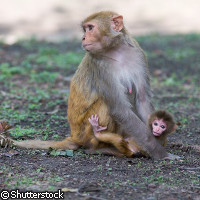Mums will be mums no matter the species
A new international study of female rhesus macaque monkeys and their behaviour towards their infants has found that macaque mothers almost exactly mirror the behaviour of human mothers towards their babies. The findings, reported online in journal Current Biology, offer intriguing evidence of the evolution of the human mother-baby interaction. Human parents exhibit very distinctive behaviour towards their infants such as rocking, gazing, searching for and maintaining eye contact, exaggerating their gestures, altering the pitch of their voices, kissing and smiling. Now an international research team has found that female macaques use exactly the same forms of behaviour to interact with their young, even 'kissing' their babies by smacking their lips together. The researchers from Italy and the US studied female-infant macaque behaviour for the first two months of an infant macaque's life. They noted a whole range of behaviour in female adult macaques that is similar to human parental behaviour towards their young, including gazing at their infant to the exclusion of anything else in the room, trying to make eye contact by holding their infant's head and pulling it towards their face, and smacking their lips at the infant (a gesture that was then copied by the infant). Also, when separated from their babies, mothers bridged the distance and bounced their heads in their infants' line of vision to get their attention. The baby macaques were also responsive towards their mothers, showing sensitivity to their mothers' expression, movements and voice. As with human babies, they also showed the ability to engage their mothers' attention, showing they are as aware of emotional reactions and interaction as human infants. 'Mutual gaze, neonatal imitation, infant gestures and exaggerated facial gestures by mothers are distinctive signs in macaques as well as in humans of interpersonal communication and perhaps even a mutual appreciation of others' intentions and emotions.' 'For years these capacities were considered to be basically unique to humans, although perhaps shared to some extent with chimpanzees,' said lead author Professor Pier Francesco Ferrari of the Università degli Studi di Parma in Italy. As a result of the team's findings, this idea will have to be reconsidered; the study shows macaques have a range of nurturing and communication qualities that we are only just beginning to identify. However, the study also revealed one interesting contrast with human mother-infant behaviour. The close attention given by macaque mothers to their babies stopped much more quickly than in humans, and by the time the baby macaques reached the age of one month, it had nearly disappeared. Professor Ferrari admitted that this is a puzzle, but suggested, 'We should consider that macaque development is much faster than that of humans. Motor competences of a 2-week-old macaque could be compared to an [8-to-12-month] human infant. Thus independence from the mother occurs very early; what happens next in the first and second month of life is that infants become more interested in interacting with their same-age peers.' The research findings offer intriguing evidence into the origin of human adult-child development. The researchers concluded: 'Our records demonstrate that humans are not unique in showing emotional communication between mother and infant. Instead, we can trace the evolutionary foundation of those behaviours which are considered crucial for the establishment of social exchange with others to macaques.'
Countries
Italy, United States



